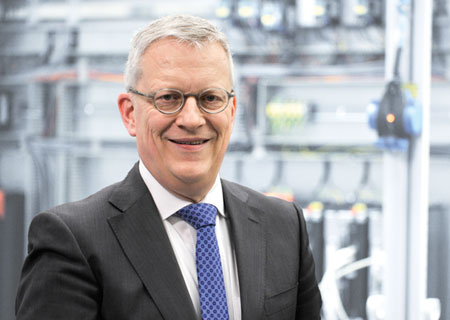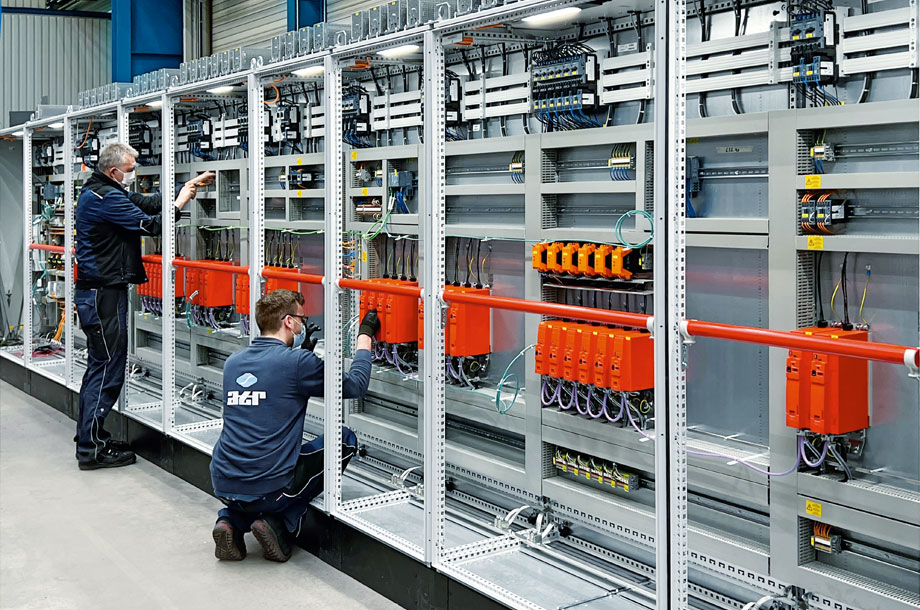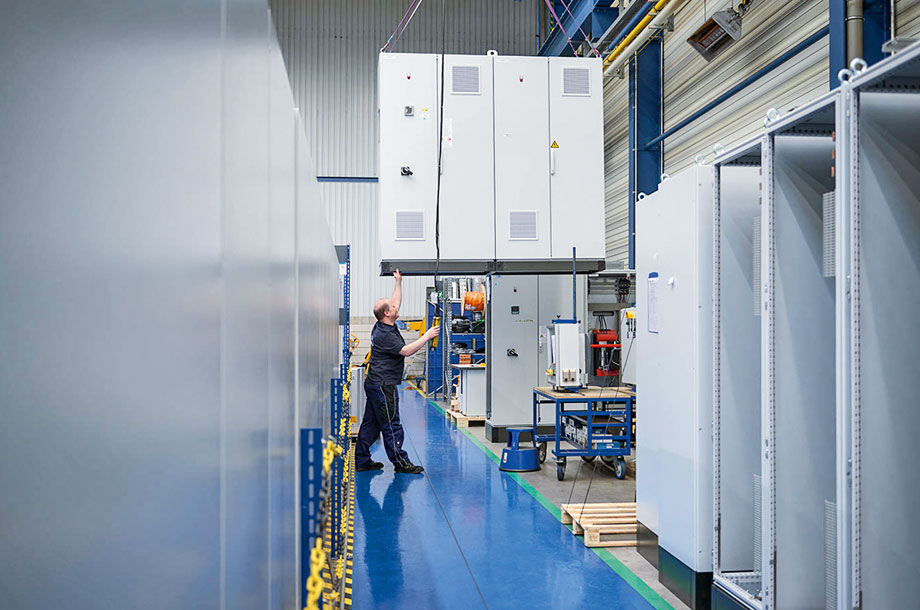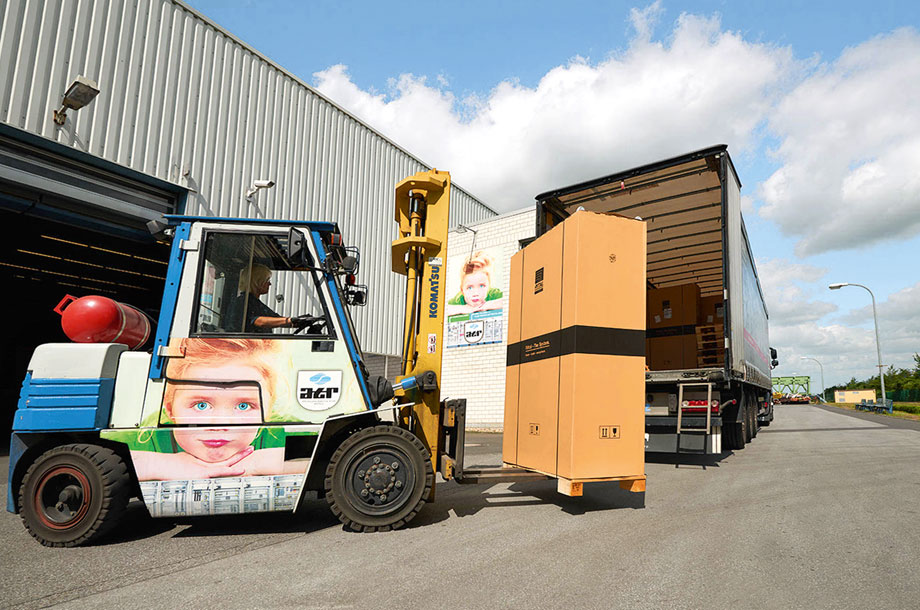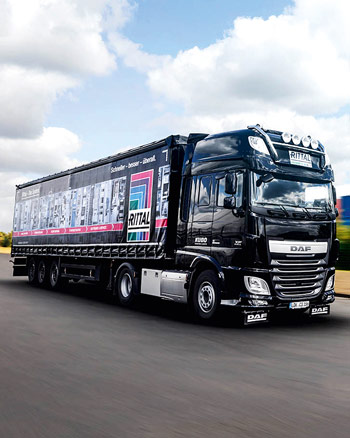Text Michael Siedenhans, Hans-Robert Koch ––– Photography
The pandemic is really putting the relationship between equipment manufacturers and their end customers to the test. Order books may be full, but supply bottlenecks are hitting the manufacturing industry worldwide. Various factors are responsible for this. Coronavirus is closing ports and businesses in production countries such as China, Malaysia and Vietnam, while their European customers are unable to find enough ships, containers, pilots, dock workers and lorry drivers to collect the raw materials and goods from the countries where they are produced and then deliver them to processors and their own customers in their domestic markets. And that’s before we even get onto the subject of rising costs. For example, the cost of transporting a shipping container from Shanghai to Rotterdam has now increased sevenfold.
THE CURRENT SITUATION – EQUIPMENT BOTTLENECKS AND EXTRA COSTS
This situation is also affecting panel builders and switchgear manufacturers such as ATR Industrie- Elektronik GmbH in Krefeld. Specialising in panel building, switchgear manufacturing and enclosure production, this German company is highly regarded in the industry. Just like many other businesses, though, ATR is currently experiencing severe supply bottlenecks. Problems with global chip manufacturing, for instance, mean there simply aren’t enough basic electronic components to go round on the market.
“We’re now having to wait up to 200 working days for components that we used to get in one or two days. ATR has never previously experienced a situation like this,” says Timo Amels, Managing Director of ATR Industrie-Elektronik GmbH, describing the current position. He goes on to explain the huge knock-on effects: “Our production processes are stalled, half-finished systems are having to be placed in interim storage and, in some cases, entire installations can’t be delivered because individual components are missing. Overall, that creates a lot of extra work and costs for us.”
THE STRATEGY – FLEXIBLE PLANNING AND PRODUCTION
So how is the management team responding to this? “Escalation is our only option. We phone all our suppliers on a weekly basis. The only way of obtaining our preliminary materials is to use escalation levels and prioritisation, but that involves a huge amount of effort and a lot of resources,” emphasises Amels. He explains that, more than ever before, planning and production now need to be flexible – and that includes departments such as incoming goods. Due to the difficult supply situation, staff are on standby every Saturday so as not to miss a delivery. “Otherwise, we may have to wait another 200 working days,” says Amels matter-of-factly.
THE PREREQUISITE – SUFFICIENT STOCKS
No Rittal customer has to wait that long. The company’s ability to deliver is unusual on the market right now and asks a lot of Rittal, sometimes stretching it to the limit. So how does Rittal manage to deliver within a very short space of time? It’s possible thanks to a supply network with permanent suppliers worldwide and the Global Distribution Centers (GDC) in Haiger and Rittershausen, where around 98 per cent of standard articles are always available. That means Rittal can meet its delivery commitment – not just for Germany, but also for its subsidiaries in countries such as Belgium, the Netherlands and Austria.
The company can respond quickly to the needs of its customers because the GDC in Haiger, for instance, maintains large stocks of products and goods. Here alone, 55 lorries set off on delivery runs every day and another 70 leave the GDC in Rittershausen. They are loaded up with large enclosure systems, small and compact enclosures, and various accessories. “This ability is unusual for an industrial logistics organisation, but it gives us flexibility, room for manoeuvre and a competitive advantage,” says Executive Vice President Christine van den Berg, who is responsible for global logistics and the associated planning and material requirements at Rittal. To ensure customers can rely on the delivery commitment, sufficient stocks always need to be available. Procurement, Production and Material Planning teams work hand in hand to make sure this is the case. Procurement has the most important task, making certain that the raw materials required for production are in stock.
PROCUREMENT – CONTROLLING AND COORDINATING FLOWS OF GOODS
That’s the job of Thomas Weber, Vice President Global Sourcing & Procurement at Rittal, and his team. The global supply bottlenecks are throwing up challenges that the experienced procurement experts never previously imagined would arise. “No sooner has our day started than we’re faced with questions such as where is there a shortage of which material, why is this and how much time do we have to do something about it?” Weber explains.
It’s often preliminary products that have not been delivered and are in short supply. Although insignificant in themselves, they are urgently needed for processing to continue. German customers are waiting impatiently for the finished products. “The coronavirus crisis has shown that we need to be far more involved in the third and fourth tier supply chain,” says Weber. In other words, he and his team phone contacts in the Far East several times a day to sort out a supply problem. “And we actually always manage it,” he adds.
THE FOUNDATION – COMBINING INNOVATION AND TRADITION
The 46 staff in the Global Sourcing & Procurement department at company headquarters in Herborn control and coordinate national and international flows of goods – from sheet steel and plastic or cardboard to electronic components. Most of this work is done digitally, using smart software tools that provide early warning of impending supply bottlenecks. Contact and face-to-face meetings with well-established, trusting suppliers are equally important. According to Weber, this combination of innovation and tradition provides the basis for delivery reliability at Rittal.
For example, the Procurement team uses a web-based monitoring tool to keep an eye on supply chains and suppliers worldwide and provides immediate notification if a delivery is at risk due to a disaster such as an earthquake, a fire at a chemical factory or an accident involving a ship. It also flags up any financial problems that supply partners are experiencing. This early-warning system makes supply chains transparent. Weber and his team are able to respond as soon as an alert flashes up on the screen. They pick up the phone or type away on their keyboards to rearrange or reroute orders.
RAW MATERIAL MARKETS – IDENTIFYING TRENDS
The monitoring tool helps maintain a constant overview of the supply status of more than 500 key suppliers and producers. These include manufacturers in countries such as Israel or Bosnia and Herzegovina, but also steelworks in India, Brazil or Turkey from which Rittal obtains quantities of steel in the six-figure metric ton range every year. “The situation on the steel market is stable again following the disruption at the height of the global lockdown. Even when the going was tough worldwide, though, we had fewer problems than other companies because we are known in the industry as a reliable and financially strong customer for large quantities. Not everyone can say the same,” explains Weber, but he also mentions the problematic situation on the global market for plastic granulates and preliminary products for electronics.
“At the moment, China is unable to supply any flame-retardant plastic additives,” he reveals. Together with experts from the Research & Development and Quality Management teams at Rittal, Weber is therefore looking for substitute materials and alternatives that meet the company’s quality requirements (more about that from page 60 onwards). The software provides a further service, using the mass of available data to generate trends and forecasts for the global raw materials markets. Weber keeps a very close eye on this information. “This glimpse into the future is extremely important if we are to order raw materials and goods in plenty of time to ensure our production always remains stable and we can maintain high stock levels,” he explains.
THE BASIS – LONG-STANDING PARTNERSHIPS
Traditional, long-standing partnerships with suppliers based in Germany and other European countries are a further key factor ensuring Rittal is able to deliver. “Some 70 per cent of our suppliers have a reliable and trusting working relationship with our company that already dates back over ten years. The typical Rittal partner is an owner-managed business with up to 2,000 employees – similar to our company,” says Weber. This, he says, creates mutual trust over the years and, as a result, the partners overcome the current supply bottlenecks together. “We still can’t fully grasp everything that is happening right now – it’s simply unheard of to have to wait for up to 70 weeks for a product,” he insists.
THE PRESENT – PRELIMINARY MATERIALS FROM EUROPE IN DEMAND
That is presumably why products and raw materials from other European countries are in demand. The shorter distances involved mean they can be supplied faster than products from competitors in China. Weber expects this trend to continue. “The demand for products and materials from Europe will grow, because they are more sustainable due to the shorter transport routes and production that is fairer and more environmentally responsible,” he explains. Rittal was quick to recognise this trend, which is one reason why it can currently gear production to requirements and is always able to deliver. One thing that is worrying Weber at the moment is Brexit and its impact on the British Isles. “We are short of drivers there, so we’re supplying our goods and products to the United Kingdom directly from our hub in Germany,” he says.
THE OUTLOOK – FAMILY COMPANIES ARE FASTER
Despite Brexit, British customers can rely on Rittal being able to deliver, but difficulties do sometimes arise. Even in times of global supply bottlenecks, Rittal meets its delivery commitment. Timo Amels is well aware of this. As the Managing Director of ATR has once again clearly seen in recent months: “Family companies have better control over their ability to deliver than other suppliers, and high stock levels mean they are well protected.” As Amels concludes, they plan ahead and are simply faster than the others: “That makes Rittal an important and trustworthy partner – a great help to us, especially in these circumstances.”
